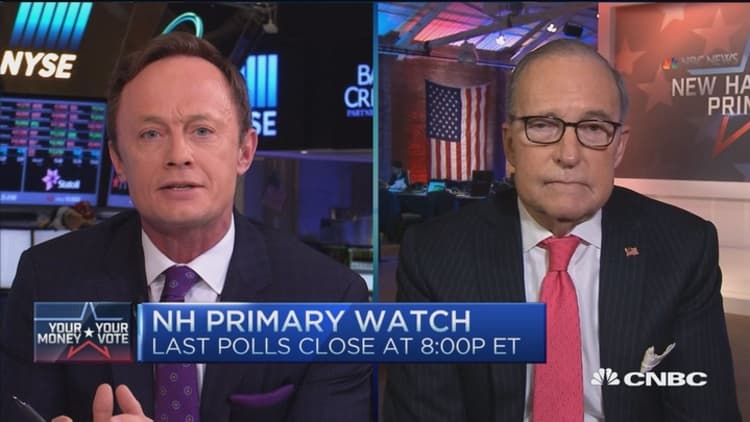


GOP presidential hopeful John Kasich said he is open to lowering the corporate tax rate below the 25 percent level he has previously put forward.
The Ohio governor has said he aims to balance the budget in eight years through a combination of tax and regulatory reform and changes to the way government administers funding.
"The agenda within the first 100 days, you're going to need to have a seat belt to stay up with it," he told CNBC on Monday, a day before New Hampshire voters cast ballots in the nation's first primary. "It's regulatory reform, because regulations kill business, particularly small business, if they're just mindless."
As president, Kasich said he would charge his vice president with untangling small business from the "morass" of regulation. He has proposed freezing all federal regulations for a year, barring health and safety rules.
In addition to lowering tax rates, Kasich said he would also make it easier for U.S. companies to bring profits home and allow them to write off investments in capital goods such as plant equipment.
The top corporate tax rate is currently 39.1 percent, the highest among developed countries.
Kasich has proposed three brackets for personal income taxes, with the top bracket topping out at 28 percent, down from 39.6 percent today. He would also lower the tax on capital gains and dividends to 10 percent.
Kasich headed into Tuesday's primary polling toward the bottom of the pack nationally, but polls show he could turn in a strong showing in New Hampshire, potentially raising his profile in future contests.
A NBC News/Wall Street Journal poll conducted after last week's Iowa caucuses suggests Kasich has the support of 10 percent of New Hampshire's likely Republican voters, putting him in fourth place behind Donald Trump, Sen. Marco Rubio and Sen. Ted Cruz.
Before becoming Ohio governor, Kasich was a congressman. As chairman of the House Budget Committee, he introduced welfare reform that President Bill Clinton ultimately signed, and was a key figure in the deal passing the Balanced Budget Act in 1997.
Kasich told CNBC he doesn't believe debates are the best format for candidates to express who they are as a person. He said voters need to believe a candidate understands their problems.
Kasich said Mitt Romney lost that battle in exchanges with President Barack Obama during the 2012 election, despite besting the incumbent on questions of competence, job growth and management.
"If people can't feel that you understand who they are and that you've got reasonable programs to answer, I don't think you win. And when you can, it's like you're hitting a home run," he said.
Under his plan to reform Social Security, Kasich said the wealthiest Americans would receive less than they anticipated, but by cutting payouts to those at the top, the system could balance out and support people who depend entirely on Social Security.
Correction: A earlier version had the wrong day the interview was conducted. it was Monday.



